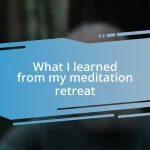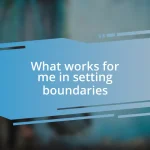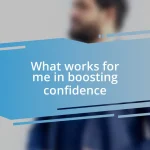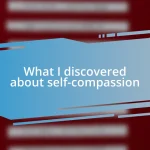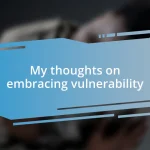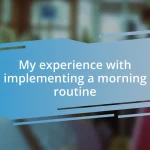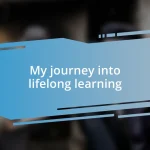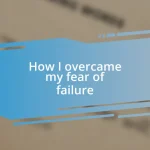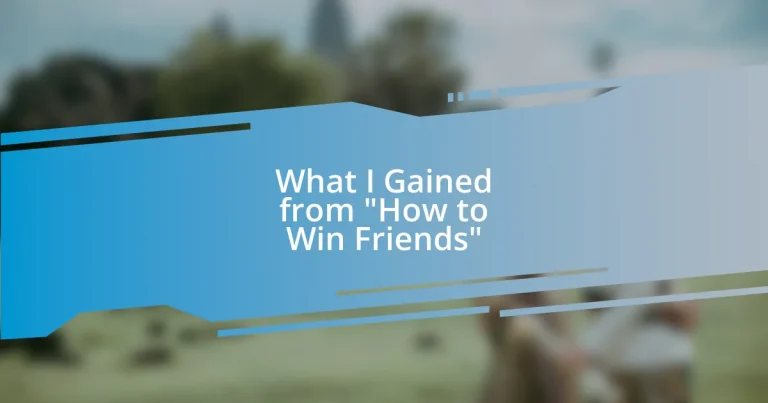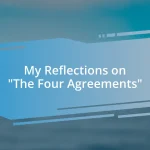Key takeaways:
- Genuine appreciation and empathy build meaningful relationships, enhancing both personal and professional interactions.
- Active listening and effective communication techniques, such as open-ended questions and mirroring, foster deeper connections and mutual support.
- Nurturing a network through vulnerability and follow-up can lead to personal growth and unexpected opportunities.
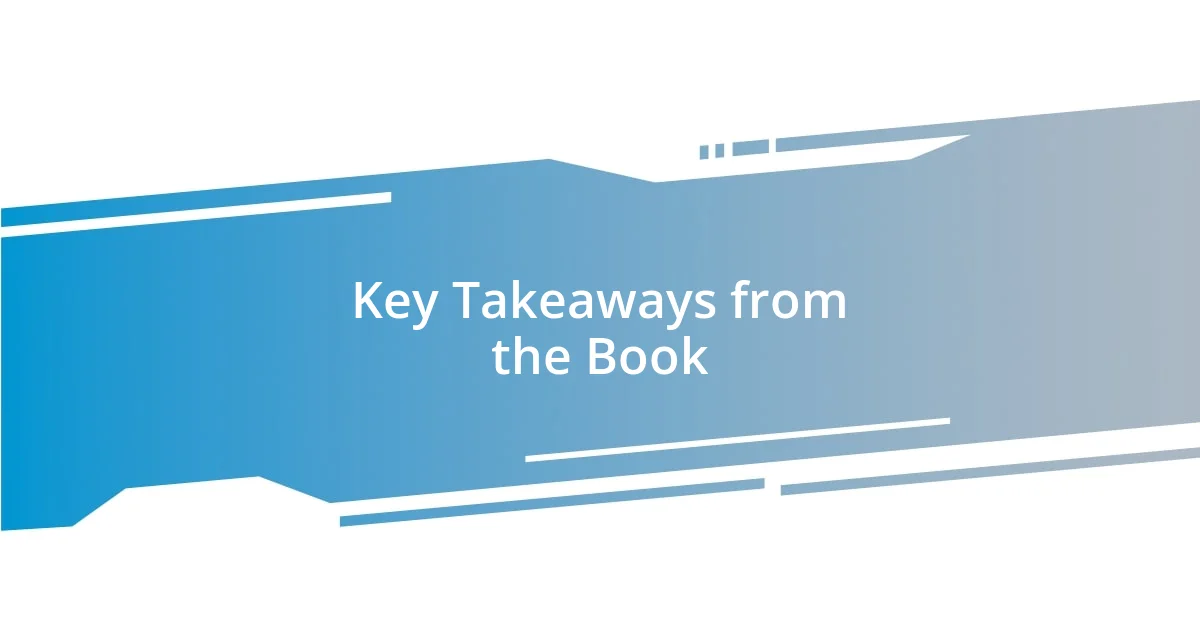
Key Takeaways from the Book
One of the primary takeaways from “How to Win Friends and Influence People” is the importance of genuinely appreciating others. I remember a time when I complimented a colleague on their innovative idea during a meeting. The look of surprise and joy on their face was priceless, and it made me realize how such a small gesture can foster positive relationships. Have you ever noticed how a simple “thank you” can lighten someone’s day?
Another key lesson is to listen more than you speak. Reflecting on my own conversations, I’ve found that when I truly focus on what the other person has to say, I create a deeper connection. Listening not only makes people feel valued, but it often leads to more meaningful discussions. What experiences have you had when someone really listened to you?
Lastly, showing empathy by understanding things from another person’s perspective can transform interactions. I recall a disagreement I had with a friend; instead of arguing my point, I paused to see things from their side. That shift in mindset not only resolved our conflict but also strengthened our relationship. It’s fascinating how embracing empathy can open doors to authentic connections, isn’t it?
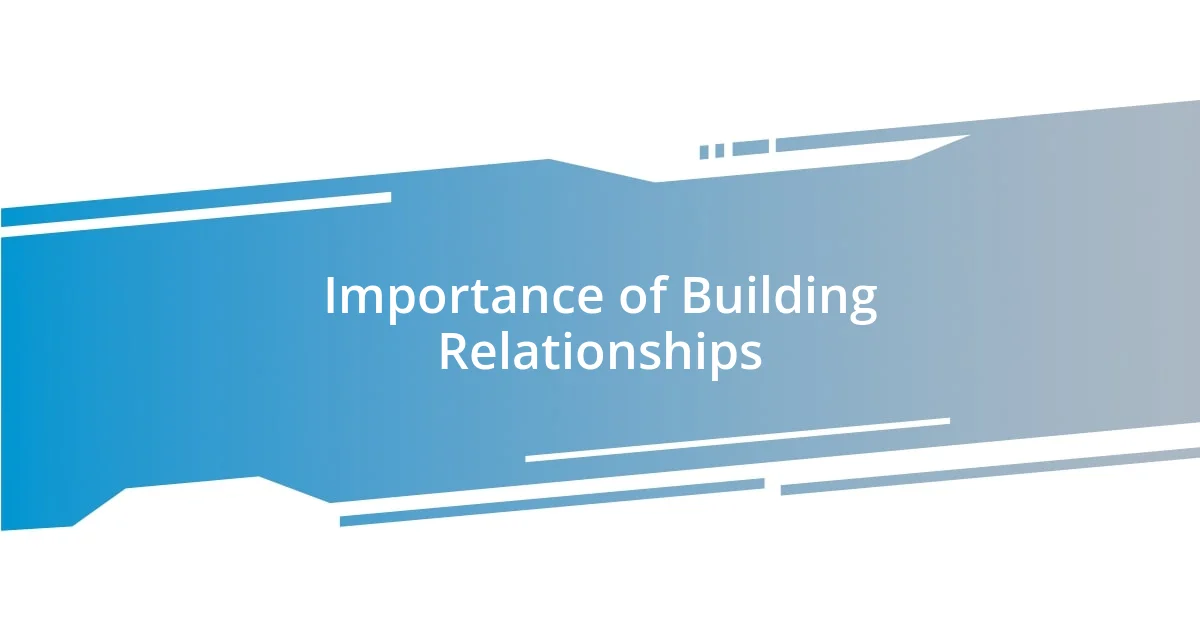
Importance of Building Relationships
Building relationships is essential in both personal and professional realms. I’ve often found that taking the time to connect with others leads to unexpected opportunities. For instance, a casual conversation at a networking event led to a collaborative project that I genuinely enjoyed. It just goes to show that simple interactions can lay the groundwork for powerful alliances.
Moreover, relationships are not just about exchanging pleasantries; they involve mutual support. I remember when I faced a particularly challenging work project. A colleague lent their expertise and guidance, which not only helped me succeed but also forged a bond of trust between us. Isn’t it interesting how helping one another can turn a simple work relationship into a genuine partnership?
Lastly, investing in relationships enriches our lives. I’ve seen firsthand how friendships can provide emotional support during tough times. Reflecting on a period of personal loss, it was the connections I had built over time that helped me navigate through the darkness. Isn’t it comforting to know that we’re never truly alone when we nurture our relationships?
| Benefits of Building Relationships | Examples from Personal Experience |
|---|---|
| Opportunities for Collaboration | Networking event leading to a successful project |
| Mutual Support | Colleagues helping each other through challenges |
| Emotional Enrichment | Support from friends during a personal loss |
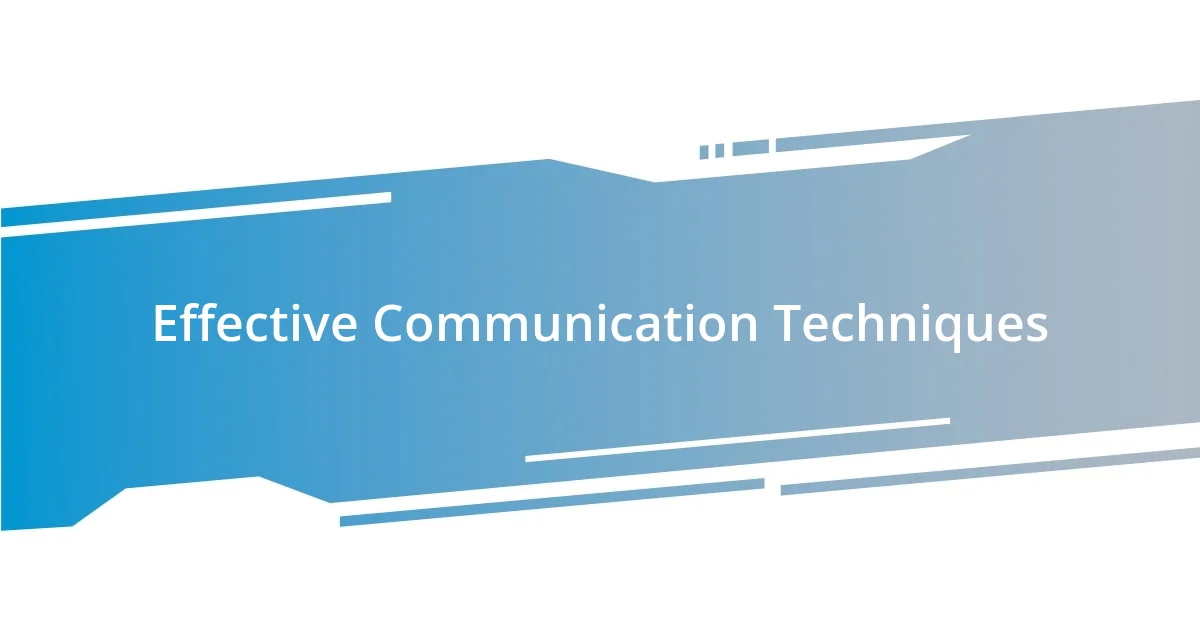
Effective Communication Techniques
Effective communication is not just about conveying a message; it’s about creating connections. I’ve realized that when I pay attention to my body language and tone, it changes how people respond to me. For example, during a recent conversation, I noticed that by maintaining an open posture and a warm tone, my friend felt more at ease sharing their concerns. This subtle shift made our dialogue far more impactful.
Here are some effective communication techniques that I’ve found valuable:
- Active listening: Show genuine interest by nodding or paraphrasing what the speaker says.
- Mirroring: Reflecting the other person’s emotions or body language can create rapport.
- Open-ended questions: Encourage deeper conversation and exploration of thoughts.
- Empathy: Share in others’ feelings to build trust and understanding.
- Clarity and conciseness: Be straightforward to avoid confusion, which I learned the hard way in a team meeting when I over-explained a simple idea.
Every encounter is an opportunity to refine these skills. During an especially challenging project, I practiced these techniques with my team. The result? A more cohesive group dynamic, where everyone felt heard and valued. Such a process continues to shape how I approach both my personal and professional relationships.
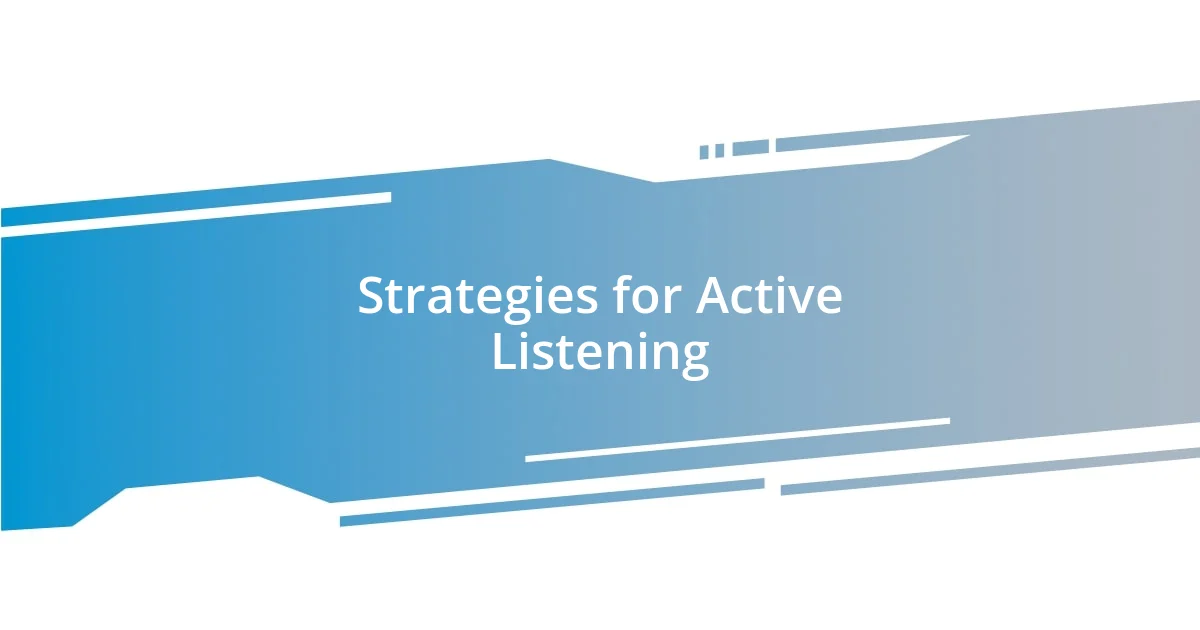
Strategies for Active Listening
Active listening is a game changer in any conversation. I discovered this during a heated discussion with a friend about our differing opinions on a project. Instead of interrupting or defending my stance, I simply listened. By nodding and summarizing their points, I noticed the tension eased, and we found common ground. Have you ever found that just giving someone your full attention can transform the energy in the room?
Another strategy that I’ve found incredibly useful is asking open-ended questions. A few months ago, I was catching up with a colleague who seemed a bit off. Instead of asking if they were okay—which often gets a polite “fine” in return—I posed a broader question about their week. This simple shift invited them to open up about their struggles, fostering a deeper connection. Doesn’t it feel rewarding when someone genuinely expresses themselves, knowing you played a part in that?
Finally, I can’t stress enough the importance of empathy in active listening. I once attended a workshop where participants were encouraged to share personal experiences while the rest practiced empathetic listening. It was eye-opening to see how validation can create a safe space for vulnerability. When we genuinely share in each other’s feelings, it builds trust and allows for authentic relationships to flourish. How often do we miss those moments of connection, thinking we’re just busy with our own lives?
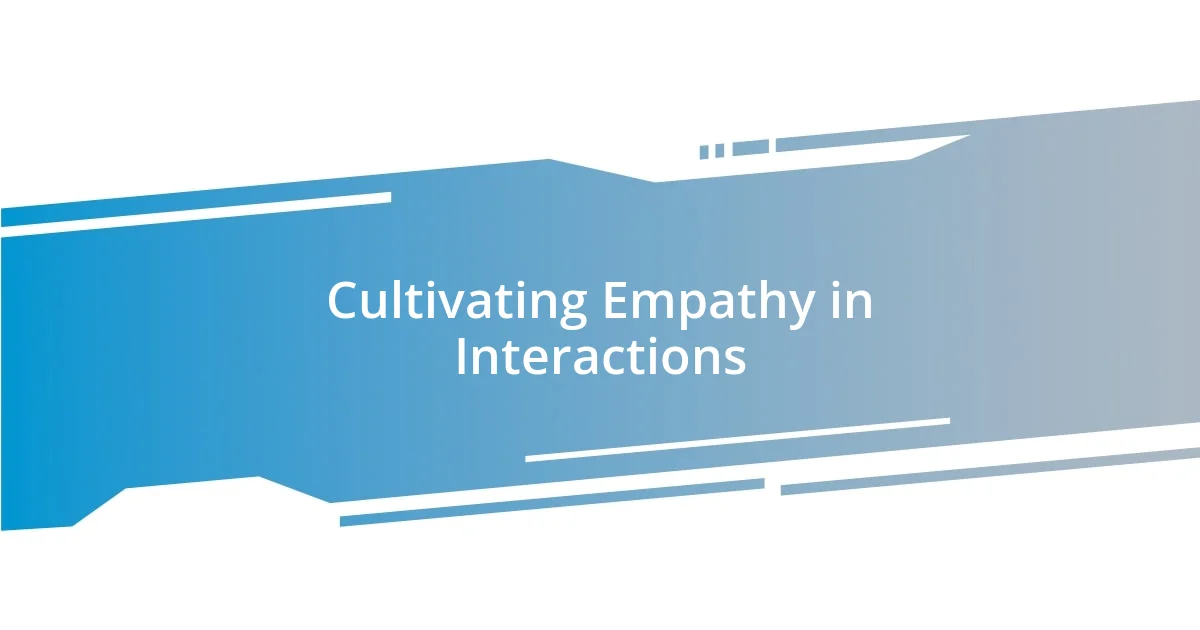
Cultivating Empathy in Interactions
Cultivating empathy in interactions requires a conscious effort to truly understand others. I remember a time when a colleague faced a significant personal challenge. Instead of simply offering my condolences and moving on, I took a moment to really listen to her struggles. That genuine engagement not only forged a deeper connection but also made her feel valued, easing some of her burdens. Have you ever noticed how a simple act of sincere concern can uplift someone’s spirit?
Practicing empathy means stepping into another’s shoes, and I often remind myself to do this, especially in tense situations. Once, during a particularly heated meeting, a team member voiced frustration about a project. Rather than labeling their feelings as irrational, I paused and acknowledged their viewpoint. This simple recognition shifted the atmosphere from conflict to collaboration. Isn’t it amazing how sharing a bit of understanding can dissolve barriers and foster teamwork?
In my experience, empathy isn’t just about understanding; it’s about validating feelings. I once attended a friend’s art exhibit where she shared the emotional journey behind her pieces. Instead of giving generic compliments, I asked about specific inspirations behind her work. A quick chat turned into a heartfelt exchange, revealing her vulnerabilities and dreams. This left me wondering: how often do we dive beneath surface-level interactions to uncover the emotional richness that lies beneath?
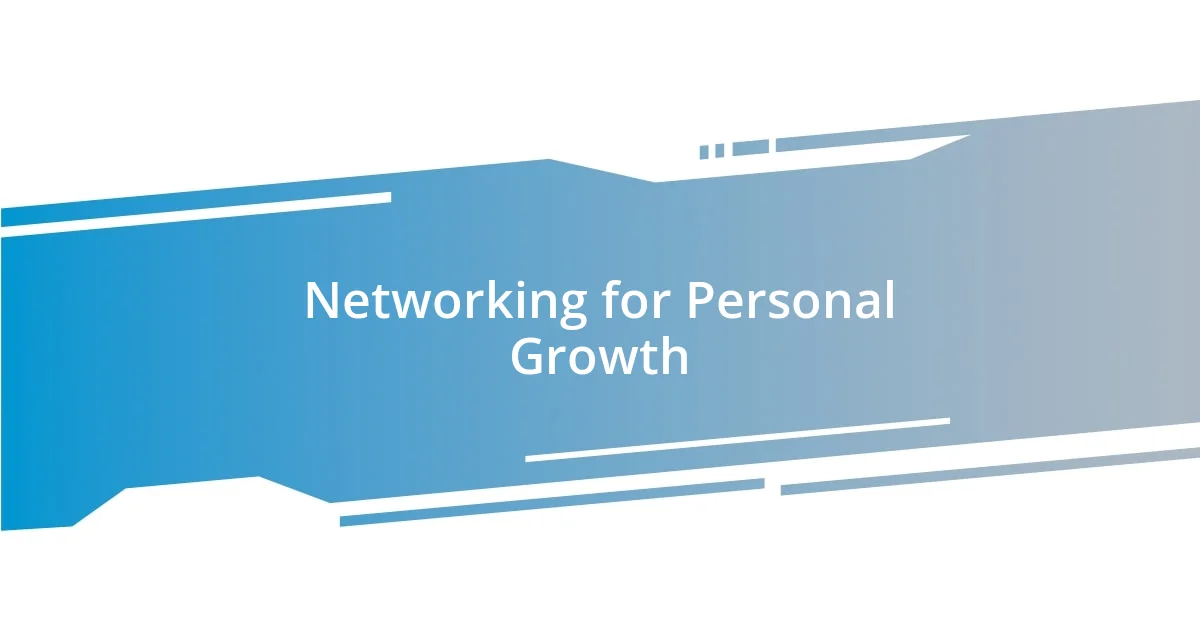
Networking for Personal Growth
Networking for personal growth has played a pivotal role in my life. I recall when I attended a local meetup focused on personal development. Initially hesitant, I decided to engage with a few attendees, sharing not just my career aspirations but also my fears about the future. To my surprise, many people responded with their own vulnerabilities, creating a powerful bond that felt way deeper than mere introductions. Isn’t it fascinating how shared experiences can form the backbone of meaningful connections?
I’ve also found that nurturing these relationships requires ongoing effort. After that meetup, I made it a point to follow up with several new acquaintances. I reached out on social media, shared articles that resonated with our discussions, and even suggested casual coffee meet-ups. This simple act of maintaining contact has not only enriched my personal growth but also opened doors to new learning opportunities. Have you ever thought about how a small gesture can lead to profound impacts in your network?
Reflecting on my networking journey, I realize that personal growth stems from a willingness to be vulnerable. I once shared my struggles with imposter syndrome in a group setting, expecting judgment but receiving empathy instead. This risk of opening up turned into an inviting space where others felt safe to share their own insecurities. It truly reinforced that connecting on a human level fosters not just personal growth but a community of support. How often do we shy away from vulnerability, missing out on the potential connections that lie just beneath the surface?
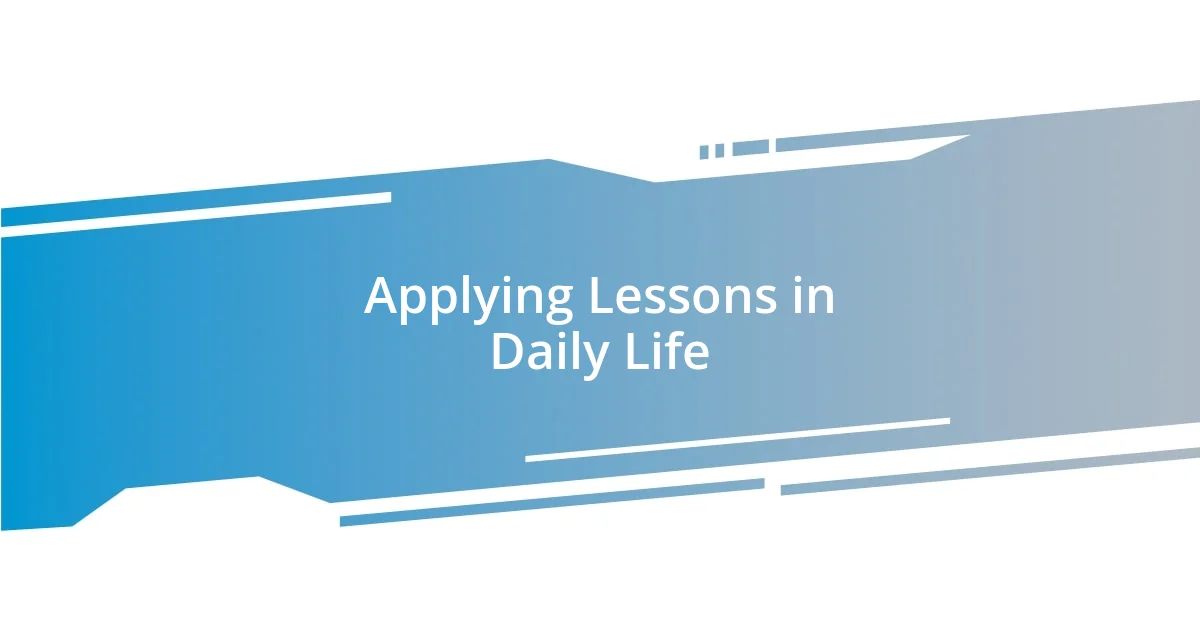
Applying Lessons in Daily Life
Integrating the lessons from How to Win Friends and Influence People in my daily life often involves consciously choosing to focus on others. For instance, when catching up with a friend, I made it a point to ask not just about their recent accomplishments but also about their challenges. The conversation quickly transformed from the routine small talk to a deeper discussion where we both felt heard and understood. Doesn’t it feel rewarding when someone genuinely cares to know your “why” behind the “what”?
I’ve started to apply the practice of remembering people’s names, a simple act that has made a remarkable difference in my interactions. I remember meeting a local entrepreneur during a workshop, and recalling his name the next time we met clearly made him light up. That moment reminded me how impactful it is to acknowledge someone’s identity. It begs the question: How often do we overlook this small yet crucial element that can enhance our connections with others?
Moreover, I’ve noticed that extending gratitude has a powerful ripple effect in my relationships. After a busy week, I took the time to write thank-you emails to colleagues who had supported me on a project. Their positive responses not only strengthened our professional rapport but also encouraged a culture of appreciation in our team. Isn’t it interesting how a little kindness can create an uplifting atmosphere and motivate everyone to go the extra mile?
